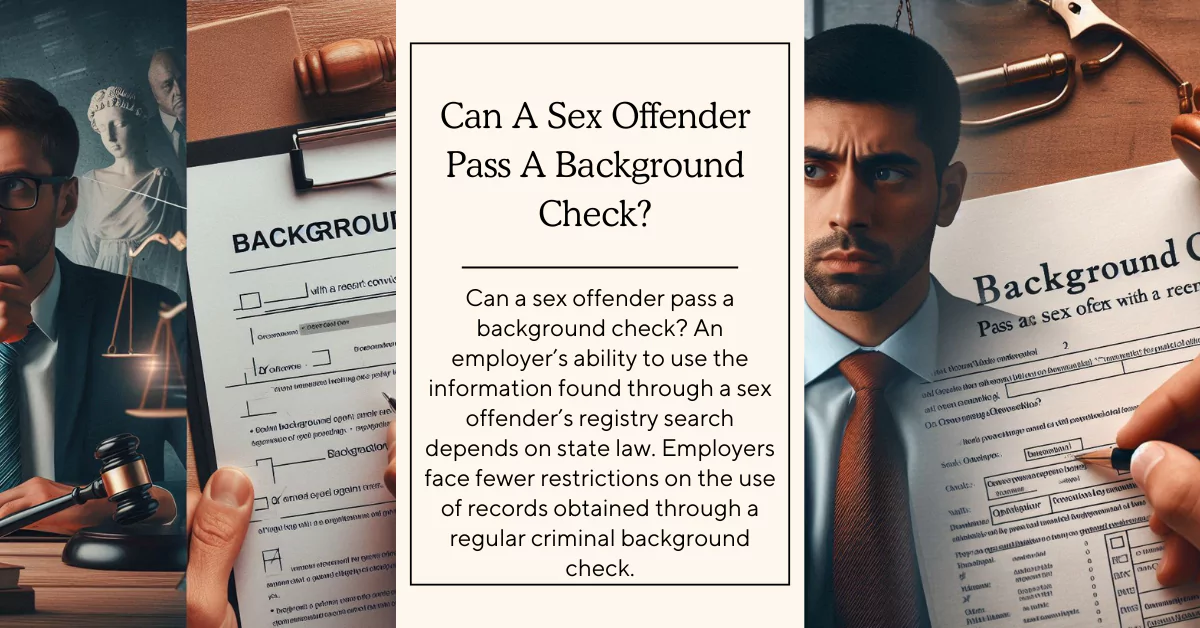In today’s hiring landscape, conducting thorough background checks is not just a best practice; it’s a crucial step for employers to protect their business, employees, and clients. Among the various checks, sex offender background checks play a vital role, especially for organizations working with vulnerable populations. This article delves into what sex offender background checks entail, their legal implications, and their importance in the hiring process.

Table of Contents
What is a Sex Offender Background Check?
A sex offender background check primarily involves searching the National Sex Offender Registry (NSOR). This registry is a database maintained by law enforcement agencies to monitor convicted sex offenders and make that information available to the public. The purpose of this check is to identify individuals who are listed as registered sex offenders and to assess any potential risks associated with hiring them.
Who Must Register as a Sex Offender?
Under the Sex Offender Registration and Notification Act (SORNA), individuals convicted of certain sex crimes are required to register as sex offenders. This law mandates that all states, along with the District of Columbia and U.S. territories, track and monitor these offenders. Convictions are categorized into three tiers, each with specific registration requirements:
- Tier III: The most serious offenses (e.g., sexual contact with minors) require lifetime registration.
- Tier II: Serious offenses (e.g., child pornography) necessitate a 25-year registration.
- Tier I: Less severe offenses (e.g., false imprisonment of a minor) require a 15-year registration.
Failure to register or update registration can lead to significant legal penalties, including potential imprisonment.
What Information Does a Sex Offender Background Check Provide?
When an employer conducts a sex offender background check, the NSOR reveals various details, including:
- First and last name of the offender
- Current address
- States where the offender is registered
While some checks may indicate the tier level of the offense, detailed underlying criminal offenses are usually reported in compliance with Fair Credit Reporting Act (FCRA) guidelines.
The Importance of FCRA Compliance
Employers must be aware of their responsibilities under the Fair Credit Reporting Act when using public record information for employment purposes. If a potential criminal record is found, the employer is required to:
- Notify the candidate that adverse information was discovered, which may affect their employment opportunities.
- Provide the name and address of the reporting agency.
Ensuring strict compliance with FCRA guidelines helps maintain the accuracy and integrity of the background checks conducted.
Limitations of Sex Offender Background Checks
While sex offender background checks can provide valuable insights, there are limitations to consider:
- The NSOR may not always be current or complete, as updates can occur at irregular intervals.
- Some offenders may fail to register altogether, thereby evading detection.
- Certain states have laws limiting the reportability of offenses below specific thresholds.
To mitigate these shortcomings, employers should consider supplementing NSOR searches with county and statewide criminal checks. This comprehensive approach offers a clearer picture of a candidate’s background.
Read Also: Will A Possession Charge Show Up On A Background Check? 2025
Why Should Employers Conduct Sex Offender Background Checks?
The necessity for sex offender background checks is particularly pronounced for employers in industries that engage with vulnerable populations, such as:
- Healthcare: Positions requiring direct patient interaction.
- Education: Roles in schools, tutoring centers, and after-school programs.
- Public Services: Jobs in hospitality, dining, and community services.
Employing individuals with a clean background is crucial for safeguarding the well-being of clients and maintaining a safe workplace.
Read More: What Does HUD Look For On Your Background Check | 2025: Essential Insights for a Successful Application
Conclusion
Incorporating sex offender background checks into the hiring process is a responsible step that can significantly reduce potential risks for employers. By understanding the legal implications, the importance of compliance, and the necessity of thorough checks, employers can make informed hiring decisions that prioritize safety and integrity.
Ultimately, a comprehensive screening process not only protects the business but also fosters trust and safety within the workplace and the broader community.
FAQs
1. What is a sex offender background check?
A sex offender background check involves searching the National Sex Offender Registry (NSOR) to identify individuals who are registered sex offenders. It helps employers assess potential risks associated with hiring candidates who have a history of sexual offenses.
2. Who is required to register as a sex offender?
Individuals convicted of certain sex crimes must register as sex offenders under the Sex Offender Registration and Notification Act (SORNA). This includes various tiers of offenses, with Tier III being the most serious and requiring lifetime registration.
3. What information is included in a sex offender background check?
A sex offender background check typically provides the offender’s name, current address, and the states where they are registered. It may also include information on the tier level of the offense, although the specific underlying criminal offense may not always be detailed.
4. How does the Fair Credit Reporting Act (FCRA) affect background checks?
The FCRA requires employers to follow specific procedures when using public record information for employment purposes. If adverse information is found, employers must notify the candidate and provide details about the reporting agency.
5. Are there limitations to sex offender background checks?
Yes, the NSOR may not always be up-to-date, and some offenders may fail to register. Additionally, certain states may restrict the reportability of lower-level offenses. To obtain a comprehensive view, employers should consider supplementing NSOR searches with county and statewide criminal checks.
6. Why are sex offender background checks important for employers?
These checks are crucial for protecting vulnerable populations, such as children, the elderly, and individuals with disabilities. They help employers make informed hiring decisions, minimizing potential risks to employees and clients.
7. Which industries should conduct sex offender background checks?
Industries that work with vulnerable individuals, such as healthcare, education, and public services, should prioritize sex offender background checks to ensure the safety and well-being of their clients and staff.
8. Can employers use information from sex offender registries in hiring decisions?
Employers must be cautious when using sex offender registry information in hiring decisions. Some states have specific laws regarding the use of this information, and employers should ensure compliance with these laws to avoid legal consequences.






